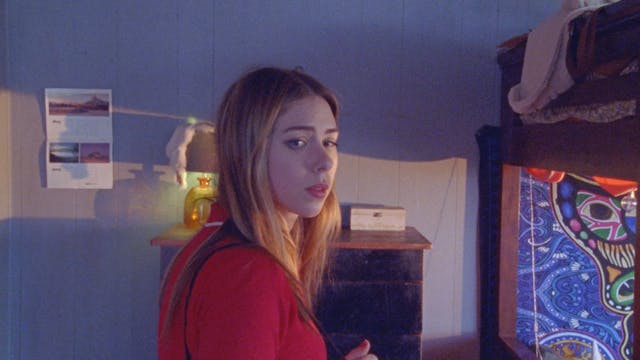Jonny Come Lately
Shot on Film
•
Short Films, Drama, 11-Jan-2016
Jonny (Deragh Campbell) watches a toy frog swimming endlessly in a plastic tub. She then drops it in the East River and it mechanically swims away. A Snow Leopard paces back and forth behind a cage, as elegant and graceful as it is pathetically trapped. Sam (Kentucker Audley) sits with a baseball bat in hand next to his mute and dazed aging father, asking the unresponsive man about Jonny. In Jonny Come Lately, the beauty of the images is as repressed as it is mutely volatile. Laconic as it is poetic, the camera holds on moments as beautiful as they are suffocating. Under the surface of small exchanges, looks and gestures, lays a world of aggression, a frustrated yearning for that magical place that might be called simply ‘somewhere else.’ From the opening strains of a sparse and syncopated drum solo, the tension is clear and a tender moment between young lovers is more foreboding than sensual. Our eyes force hope into spaces it does not belong.
When Jonny and Sam dance to the strains of Miles Davis, on the wall behind them is a framed print of a painting by Kirchner: The Artist and His Model (1910), as distant and cold as the dance between the young couple. The music and image are from another time, as is the whole palette of the lushly photographed short film. Shot on 16 mm, the story it tells seems intentionally inarticulate, as if language and communication are the problem, not the solution. When the movie climaxes and we finally get conversation relating to what what we see and have seen, it is explosive and tragic, smothering any hope there might have been. Despite the lack of any direct aggressions, there is a claustrophobic violence embedded in each interaction, such that even a doomed escape seems better than what remains.
Francesca Coppola has made two intensely personal short films and has proven herself a filmmaker with a unique voice through moving stories about tragic failures of intimacy. In both Flamingos (2012) and Jonny Come Lately each interaction reveals the trouble built into the smallest details. The deeply human writing, combined with the formal elegance of the design, framing, tone and performances pulls us willingly into what might otherwise be an arduous journey. If her work harkens back to the classic era of 1970's films, it does so with a yearning not only for a different time, but also another way of being, when this interior world of suffering was hopeful, open and free. -Keith Miller
Up Next in Shot on Film
-
Girlpower
Waking in the home of a one night stand, a woman steals one thing while forgetting another. “Girlpower,” directed by Caydon LiRocchi, is a minimal, richly observed character study about a morning in the life of a young woman in L.A. Slowly we learn fragments about her life. She has an upcoming do...

